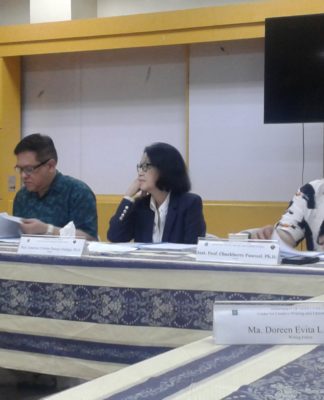 THE PHILIPPINE visit of Pope Francis may be a boon to Catholics and a bane to non-Catholic Christian groups who are otherwise critical of and even hostile to the papacy. So it was quite a pleasant surprise for Catholics to hear Eddie Villanueva, leader of the Jesus is Lord Movement, the evangelical church, telling the Philippine Daily Inquirer that Born Again Christians were not prohibited to join the papal events.
THE PHILIPPINE visit of Pope Francis may be a boon to Catholics and a bane to non-Catholic Christian groups who are otherwise critical of and even hostile to the papacy. So it was quite a pleasant surprise for Catholics to hear Eddie Villanueva, leader of the Jesus is Lord Movement, the evangelical church, telling the Philippine Daily Inquirer that Born Again Christians were not prohibited to join the papal events.
“Aside from the Catholic Church, others who value genuine world peace, freedom of worship and interfaith dialogue should also welcome this historic event,” said Villanueva.
This statement drew flak from non-Catholic Christian leaders who accused Villanueva of leading Christians astray.
An open letter published in the Discerning Sheep Ministry website, signed “From a fellow Christian, Nelson of The Discerning Sheep Ministry,” expressed the group’s disappointment with Villanueva’s “sudden association” with the Catholic Church, which allegedly abets “idolatry and false worship.”
A Facebook user condemned Catholics since they allegedly “worship” and “consider the Pope as their own god.”
A Twitter user who identified herself as an Iglesia ni Cristo (INC) member wished for the death of those who were blessed by the Pope. She called them “pests.”
“Sana pagpapatayin din ng mga Muslim ang mga Katoliko sa misa ni @Pontifex nang mabawasan ang mga salot sa mundo!” her Twitter post said.
“Wanna invite Pope Francis to listen to our Bible study in Iglesia ni Cristo for sure mapapahiya lang si @Pontifex,” she said. “Sana madapa tong #PopeFrancis na ito para matuwa naman ako sa pagbisita niya.”
All these statements were released during the week when the Pope was on a mission of “mercy and compassion” to the Philippines, enjoining everyone not to look at his own person but at the person and message of Jesus Christ.
I blame this kind of mentality not on differences in religion but on the incurable cancer of the Filipino—criticizing without understanding.
It has become the habit, especially in the age of social meida, to post and say whatever they want, most of the time behind the anonymity of a social media account, without first taking the time to understand.
If we review the Catechism, there’s nothing there that considers the Pope as a god worthy of worship. The Catechism states that the Pope is the Vicar of Christ, the successor of St. Peter and the apostles; that is he is a human representative of Jesus Christ.
But apparently, some non-Catholics choose to twist what the Church has been teaching all along.
I am not a Catholic. As a Born Again Christian, I ask my fellow non-Catholic Christian brothers and sisters to stop speaking without understanding, stop condemning without analyzing, and stop looking for war when they can foster peace.
I do not defend the Catholics, but let us not generalize.
Let us remove the perception that the Catholic Church teaches her flock to worship the Pope because as a former writer and editor of the Witness section of the Varsitarian, I have attended several Masses and Catholic events, but never have I heard a priest ask the attendees to worship and bow down to the Pope.
I have read some parts of the Catechism, and never have I seen a statement directing them to equate the Pope with Christ. Catholics know the difference.
It saddens me that religion divides society. Catholics and Born Again are both Christians. Christians are those who accept Jesus Christ as their Savior and who believe that Christ is the Son of God.
Pope Francis even held a dialogue with different religious leaders last Jan. 18 in UST in fulfilment of one of the goals of the Second Vatican Council to foster ecumenism and unity among all Christian churches.
Yes, there could be differences in the teachings of Catholics and non-Catholic Christians, but these should not be the bases for calling on the former’s death and perdition.
The solution to religious conflicts is not that complicated. We just have to learn to understand that differences are inevitable and recognize that respect is an important element in achieving peace and unity among churches, religions, and nations.
Just like what Villanueva said: “Let there be no barriers. Let there be a free market of ideas as religious leaders freely discuss the pros and cons of their respective beliefs and push for freedom of worship. That is, without resorting to violence.”












